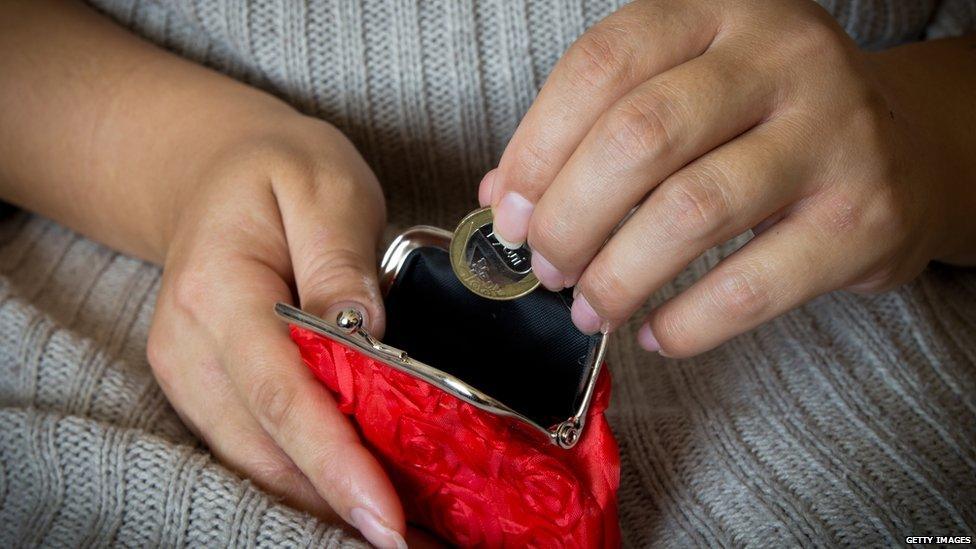Esther McVey apologises to MPs over Universal Credit claims
- Published
Esther McVey: "In fact, the NAO did not say that."
Work and Pensions Secretary Esther McVey has apologised to Parliament for making "inadvertently misleading" statements about Universal Credit.
She said she had "mistakenly" told MPs on Monday the National Audit Office felt the benefit was progressing too slowly and should be rolled out faster.
The head of the spending watchdog had said the claims were "incorrect" as it had reservations about the process.
Labour had called on Ms McVey to apologise or "consider her position".
Ms McVey told MPs that she had meant to say that the spending watchdog believed there was "no practical alternative" to continuing with the development of Universal Credit, which rolls six benefits into one.
But she stood by her assertion that the NAO had not been able to examine the impact of recent changes to how claimants were receiving their payments as they "were still being felt and by definition, couldn't have been fully taken into account by the report".
Asked earlier about Ms McVey's conduct by Labour MP Marsha de Cordova, Theresa May said her colleague would be "correcting the record".
In a report published last month, external, the NAO said the government's flagship benefits system was not delivering value for money and could end up costing more to administer than the benefits system it is replacing.
It warned some claimants switching to Universal Credit, which rolls six working-age benefits into one, had waited eight months to be paid.
While the report noted that the Department for Work and Pensions did "not accept" that Universal Credit had caused hardship among claimants, it pointed to a recent internal departmental report that showed 40% of claimants were experiencing financial difficulties.
The head of the NAO - Sir Amyas Morse - took the unusual step of writing to Ms McVey to take issue with how she responded to the report.
Speaking in the Commons on 2 July, Ms McVey said the report had not taken into account "significant" changes recently made and their impact on the number of people being paid on time and in full.

What is Universal Credit?

Universal Credit merges six benefits (income support; income-based jobseeker's allowance; income-related employment and support allowance; housing benefit; child tax credit; working tax credit) into one.
It was designed to make claiming benefits simpler. A single payment is paid directly into claimants' bank accounts to cover the benefits for which they are eligible.
Claimants then have to pay costs, such as rent, out of their UC payment. It can be claimed by people whether they are in or out of work - but payment decreases as you earn more.

She said 80% of claimants had received their payments in full and on time and of the 10% who had not received any money within the first month, this was down to problems with self-verification and not fulfilling their commitments.
In response to further questions from Labour MPs, she said the watchdog was "also concerned that it was rolling out too slowly... and needs to continue at a faster rate".
Labour MP: Has McVey offered resignation?
But Sir Amyas said the report had been based on the most up-to-date information and had been "fully agreed" with DWP officials a week before its release.
He added: "I'm afraid your statement that the NAO was concerned Universal Credit is currently "rolling but too slowly" and needs to "continue at a faster rate" is also not correct.
"While we recognise regrettable early delays, my recommendation made clearly on page 11 of the report is the department must now ensure it is ready before it starts to transfer people over from previous benefits.
"This will avoid the department's performance declining further as it faces higher claimant volumes.
"I also recommended the department learns from experiences of claimants and third parties, as well as the insights it has gained from the roll-out so far."
He said it had not been calculated how many claimants were experiencing difficulties or hardship but it was known that 20% of claimants were not paid in full on time and 25% said they couldn't make an online claim.

Analysis by the BBC's Alex Forsyth
Esther McVey is no stranger to controversy. As employment minister in David Cameron's government she was often sent out to defend contentious policies such as the so-called bedroom tax.
Supporters praised her straight-talking style, but her approach attracted criticism too - not least comments she made apparently defending a rise in the use of food banks.
Ms McVey lost her Wirral West seat in 2015 before returning to Parliament last year as MP for Tatton. She was quickly promoted to the cabinet. As work and pensions secretary, she was criticised for suggesting changes to child tax credits which mean sexual assault victims must prove their eligibility might be an opportunity for women to get help.
Being publicly rebuked by the National Audit Office is another damaging moment - but so far Ms McVey looks set to keep her job. Her apology to Parliament was by no means unprecedented - other ministerial careers have survived similar incidents. And right now, Theresa May can ill afford further turmoil at the top of government by risking a cabinet reshuffle.

Shadow work and pensions secretary Margaret Greenwood had said Ms McVey had "appeared to mislead Parliament" which was a "very serious matter".
She had called on Ms McVey to make a full apology or "consider her position".
Universal Credit is currently available in 353 job centres and the government says it is "on track" to be rolled out to all job centres nationally by the end of 2018.
In her 2 July statement, Ms McVey said 83% of claimants who responded had said they were satisfied with customer service.